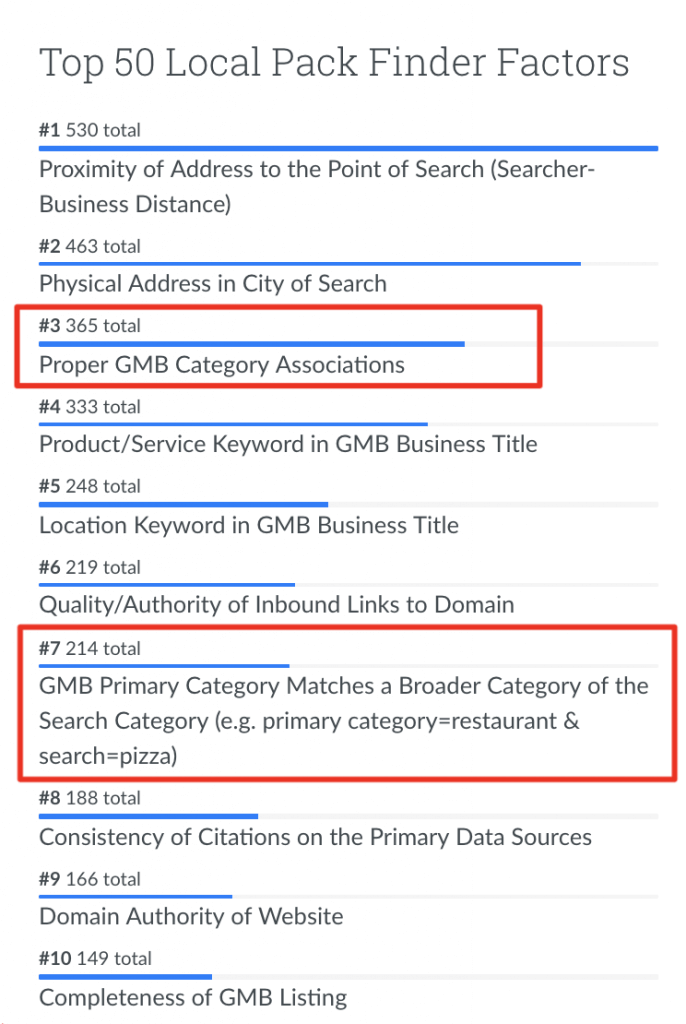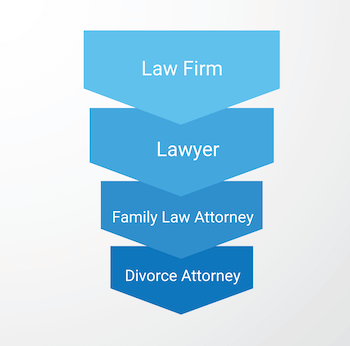Recent studies have suggested that getting the right primary and secondary business categories in place for your clients’ Google My Business profiles can really help local rankings. But with the categories themselves regularly changing, you need a solid process for testing and deciding how to select the best ones for your clients. Carrie Hill is here to help make sure you select the best category every time.
In the 2018 version of Moz’s Local Search Ranking Factors Survey, contributors indicated that having a complete Google My Business (GMB) listing is a key element in ranking well in the local pack and maps. When we break it down even further, we can see that two of the top ten local pack ranking factors are related to the category you choose for your business.
Making sure that the primary category you’re using for your business is the best possible choice based on your business’ products, services and/or goals can make a big difference as you try to improve visibility for terms related to that category.
Many say this is obvious—just pick what you are, right? Unfortunately, in some cases it’s more complicated than that. Single location businesses with a narrow focus (i.e. a divorce attorney) can just pick “divorce attorney” and be done with it, for example.
But…..
What if that single location divorce attorney has multiple lawyers in a single location, and each attorney has their own Google My Business listing?
Practice and practitioner listings are kosher with Google under their Terms of Service, but only for certain verticals. This poses a more complicated problem. How do you choose a primary and secondary category without poaching or creating competition between your own employees (lawyers) and your business (practice?)
This is further complicated when that single-location business doesn’t have a narrow focus (for example, HVAC, plumbing, water conditioning and backflow testing).
So how do you pick the primary category for a business that could cover multiple categories?
Let’s explore some options.
Single-location business with a narrow focus (like our divorce attorney above)
This is pretty simple. The firm GMB category should absolutely be “divorce attorney”. You can use the other options as secondary categories, but the primary category should be the most specific category that answers the question, “This person is (a/an) ___________.”
Single-location business with a broad Focus (for example, HVAC, plumbing, water conditioner installer)
I have a client like this, actually, and I made him prioritize the types of business he wanted to attract; what is most important to him moving forward. He ranks really well organically for plumbing terms, but he’d like to focus more on HVAC.
Knowing that, I advised him to choose the category where he wanted to grow, with the understanding that he’d need to invest in more than just picking a category to make it happen. Landing page content needs to align with category subject, and some quality links and citations for that niche wouldn’t be a bad idea.
Practice/practitioner or agent/agency listings (real estate office vs real estate agent, or dental clinic vs dentist)
In certain cases where the employee of the business has its own designation and customer base, both the business and the “employee” of that business can have a Google My Business listing. This is referred to as “practice/practitioner” or “agency/agent” relationships.
The firm’s listing can be categorized as “law firm” or it can be categorized as “divorce attorney.” The attorneys within the firm can be “lawyers”, “family law attorneys” or “divorce attorneys.”
Having the practice and the practitioner show up for a single category in a local query, in a small market, can be a bonus. The proximity to the searcher can also help this, if applicable.
Depending upon the competitiveness of your market and the proximity of your competition, having both the practice and the practitioner use the same category can also muddy the waters a bit, though, so you should test this using different categories for your listings versus using the same categories for everyone’s GMB listing.
If you wanted to cover more categories, the “firm” could be “divorce attorney” and the individual practitioner(s) could also be “lawyers”. You could also pick the most prominent listing (the one that ranks well already with more reviews) and give a practitioner the “divorce attorney” category if the firm has a weaker profile than the attorney.
Multi-location businesses in the above scenarios
Most of the time, a business’ multiple brick-and-mortar locations don’t have to worry about competing listings. However, there are cases where these locations may be close to each other, and those listings could be competing if they have the same category.
That’s not necessarily “bad”, but it’s something to be aware of. An example might be a dentist’s office with a few locations within the same city, or an adjacent office/suite that houses the hygienists or orthodontists.
Technically, they could be eligible for their own GMB listing, but you need to be sure the category they choose aligns with what they do in that location.
How do you pick a category for those locations? Again, the more specific you can get, the better, but you might benefit from spreading out primary categories as well. The only real advice I have for you here is to test different options until you find the right combination that not only seems to make Google happy to show your listings but also brings you more qualified traffic.
Secondary Categories
While the primary category is the most important choice, secondary categories are still important to ranking and relevance. Don’t just pick a primary and leave the rest blank. Instead, add in those “rejected” opportunities for the primary category designation as secondary categories. If you choose “Divorce Attorney” for your primary, for example, choose “Family Law Attorney”, “Lawyer”, and “Law Office” as secondary categories.
Seasonality
When seasons change, sometimes so does the focus of a business! An HVAC contractor might do most of their work on AC units in the summer and on furnaces in the winter. Changing your primary category to suit the seasonality of your business is a good habit to get into. If someone is searching for a furnace repair person, we don’t want them to see “a/c repair” as your category in the 3-pack, local knowledge panel, or maps listing!
Where categories don’t work like they should
Practice and practitioner listings are not perfect, and therefore there are some cases where Google doesn’t have it right.
As far as I know, for example, a tattoo studio cannot have practice and practitioner listings, and neither can a beauty salon and its hairdressers. While both have their own clientele and require training and specific skill sets, Google does not recognize them as being eligible for listings that share an address with their employer.
This feels a bit elitist to me. I know of two specific cases where a tattoo artist and hairdresser were denied listings. I’d love to give Google the benefit of the doubt, so if you have any use cases where this is not the case, I would love to hear about them in the comments below!
Conclusion
As with most things “SEO” we find that the answer to the GMB category question is, in most cases, “it depends.” Although it may seems like we say that a lot, the variables of competition, location, business type and proximity to your target market make blanket statements nearly impossible.
The best thing you can do? Test different options and make sure you’re keeping track of what works best for you (annotations in Google Analytics, anyone?) Having your call-tracking and UTM codes on links from your GMB listing is imperative to helping you ensure you’re making judgements based on data. Go forth and test, and good luck!
Carrie Hill is co-founder of Ignitor Digital Marketing with her mentor and business partner, Mary Bowling. They focus on comprehensive audits and marketing for businesses working to increase their location prominence in a variety of niches and markets around the US and Canada. In her spare time, Carrie is a voracious reader and foodie. She can usually be found stirring cream sauce with one hand while holding a book in the other. You can find her on Twitter at @CarrieHill.
The post How to Choose the Best Google My Business Category for Any Local Business appeared first on BrightLocal.
BrightLocal https://www.brightlocal.com/2019/01/14/how-to-choose-the-best-google-my-business-category-for-any-local-business/

